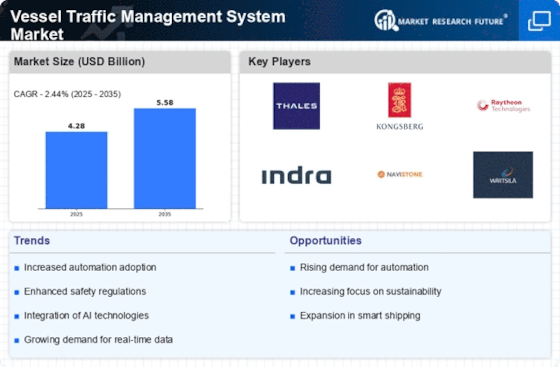Market Trends
Key Emerging Trends in the Vessel Traffic Management System Market
The Vessel Traffic Management System (VTMS) market is witnessing several notable trends that are shaping its current landscape. One prominent trend is the increasing adoption of advanced technologies for improved navigation and surveillance. VTMS solutions are incorporating state-of-the-art technologies such as Artificial Intelligence (AI), machine learning, and real-time data analytics to enhance their capabilities. This trend not only improves the efficiency of traffic management but also enables better decision-making by providing actionable insights to maritime authorities and vessel operators.
Another significant trend in the VTMS market is the rising importance of environmental sustainability. With a growing focus on reducing the ecological footprint of maritime activities, VTMS solutions are incorporating features to optimize vessel routes, minimize fuel consumption, and reduce emissions. This trend aligns with global initiatives for sustainable and eco-friendly shipping practices, driving the development of VTMS systems that contribute to both operational efficiency and environmental responsibility.
The integration of unmanned systems, including unmanned aerial vehicles (UAVs) and autonomous vessels, is a noteworthy trend in the VTMS market. These technologies offer enhanced surveillance capabilities and can be deployed for monitoring and managing vessel traffic in remote or challenging maritime environments. The trend towards unmanned systems reflects a broader shift towards automation and autonomy in the maritime industry, with VTMS playing a crucial role in facilitating the safe integration of these technologies.
Cybersecurity is emerging as a critical trend in the VTMS market. As these systems become more interconnected and reliant on digital communication, the risk of cyber threats has escalated. VTMS providers are increasingly focusing on robust cybersecurity measures to protect against potential attacks on communication, navigation, and surveillance systems. This trend is expected to continue evolving as the industry recognizes the importance of safeguarding critical maritime infrastructure.
The trend towards cloud-based solutions is gaining traction in the VTMS market. Cloud technologies offer scalability, flexibility, and accessibility, allowing VTMS providers to deliver services more efficiently. Cloud-based VTMS solutions enable real-time data sharing and collaboration among stakeholders, leading to improved overall performance and responsiveness. This trend aligns with the broader shift towards cloud adoption in various industries, emphasizing the benefits of remote access and data management.
Data integration and interoperability are key trends driving advancements in the VTMS market. Stakeholders in the maritime ecosystem, including port authorities, shipping companies, and regulatory bodies, require seamless data exchange for effective traffic management. VTMS solutions that prioritize interoperability and facilitate the integration of diverse data sources are gaining prominence. This trend is driven by the need for a unified and comprehensive view of maritime activities, enhancing decision-making processes and overall operational efficiency.
The trend towards predictive analytics is transforming how VTMS solutions operate. By leveraging historical data and advanced analytics, these systems can predict potential issues, such as congestion or safety risks, allowing for proactive intervention. Predictive analytics contribute to better resource allocation, improved incident response, and overall optimization of maritime traffic. This trend reflects a shift from reactive to proactive approaches in managing vessel traffic.


















Leave a Comment